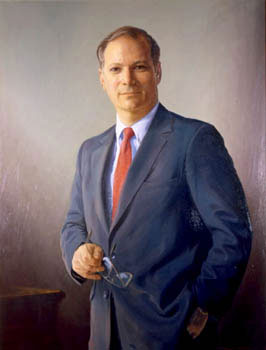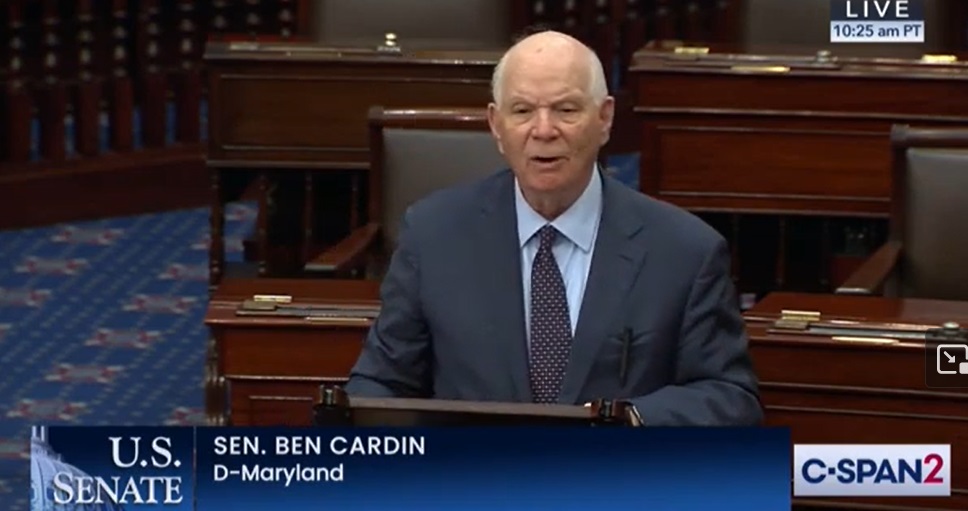This column appears in the November issue of The Business Monthly serving Howard and Anne Arundel counties.
Ben Cardin hasn’t slowed down. Maryland’s senior U.S. senator turned 81 Oct. 5. Come Jan. 3, Cardin is retiring and will be out of elected public office for the first time in 58 years after winning 18 elections.
I know he hasn’t slowed down because I had tried to get a face-to-face interview since June. I finally got a half-hour Sept. 12. I could have used an hour or more, but it was foolish to ask. (Click here for a transcript of the full interview.)
“For every minute of the day,” explained Cardin, “there are 10 other requests that you turned down for that minute. … So, no, there’s no slowing down. The Senate Foreign Relations Committee [which he chairs] could take 500% of my time. Listening to community needs could take 500% of my time. I want to make sure I’m still there as their senator until January 3rd. I’m out in the field. I’m doing my foreign relations work. I’m fighting for funding the Key Bridge. That takes a lot of work.
“This job, it’s so important you got to give it your all. No, there’s no slowing down. At all. Zero. Ask, [his wife] Myrna. She still doesn’t see me for dinner.”
How typical of Cardin, a serious, hardworking legislator with more wisdom than flash.
Mr. Speaker

This portrait of a young Ben Cardin has hung in the House of Delegates chamber at the State House for decades. Maryland State Archives photo
I first met Ben 44 years ago when he was speaker of the Maryland House of Delegates. He was just 37, the youngest speaker in Maryland history. In 1966, he had been elected to fill his uncle’s delegate seat from Baltimore City at the ripe old age of 22, seven months before he graduated from the University of Maryland law school at the top of his class.
Ben remembers his State House years fondly, as do I, covering it for a chain of community papers.
“It was very difficult for me to give up being speaker of the Maryland General Assembly. It is a great job. As you know, there was no threat from me staying on as speaker of the House. I could have stayed there comfortably and been very happy and very productive.”
As speaker, Cardin was considered the go-to guy in Annapolis, more progressive and ambitious than the two other Democrats at the top, laid-back Gov. Harry Hughes and the fiscally conservative Senate President Jim Clark of Howard County. Much more than it is today, Maryland governance was a collaborative process where there were few, mostly moderate Republicans to contend with and the conservatives were mostly rural Democrats like Clark.
The 3rd Congressional District seat opened up when then-Rep. Barbara Mikulski decided to challenged Hughes for the U.S. Senate seat of retiring Republican Sen. Charles Mathias.
In his 10 elections to the House, Cardin faced no serious challenges in either the primary or the general, sometimes gaining 70-80% of the vote. Only in the 2006 Senate primary race did he get less than 50% of the vote, winning 43% facing a significant opponent in former (and now current) Rep. Kweisi Mfume who got 40% in a field of 17 candidates.
In the U.S. House, which Cardin describes as a much more congenial place in those years, he spent his time on the Ways & Means Committee focusing on health care, fiscal issues and retirement income. He sponsored and passed legislation to expand Medicare coverage for preventive screening such as colonoscopies and mammograms. Among his proudest accomplishments was leading the push to provide dental care for children in the Children’s Health Insurance Program, after a 12-year-old Prince George’s County boy died from complications following an untreated tooth infection. In 2001, he won passage of a bill allowing higher contributions to IRAs and 401(k)s.
Recently, along with other Democrats in the House and Senate, Cardin worked to reduce the cost of prescription drugs in Medicare through negotiations with drug companies, a major accomplishment touted by the Biden administration. Cardin got a shoutout from President Biden at an Aug. 15 event with Kamala Harris at Prince George’s Community College touting the plan to reduce prescription prices.
Cardin “is one of the finest, most decent men I’ve ever worked with,” Biden said. “When I think of integrity, I think of Ben Cardin. He does what he says, and he says what he does.”
And of course, Cardin and his staff paid close attention to the needs of Maryland and his constituents.
Human rights
Nationally, Cardin is best known for his work on human rights around the world, issues he’s been working on since his early days in Congress. The Magnitsky sanctions, named for a Russian lawyer who died in prison, were Cardin’s concept that he got passed into law.
“These are the primary sanctions against human rights abusers, corrupt leaders,” not nations, Cardin explained. “There’s been about 700 individual cases where they’ve been used.”
“These sanctions prevent a person from coming to America or using our banking system. I was able to get it done even though it was opposed by the Obama administration. I was able to get it enacted and convince Europe, Canada, the UK to follow suit. It is the most effective way to deal with corrupt leaders and oligarchs because they don’t want these sanctions imposed against them.”
Do they work? “I can tell you they work because the first issue that [Russian president Vladimir] Putin mentioned to Trump when they first met was getting rid of the Magnitsky sanctions. It affected Putin’s ability to run his corrupt regime, I can tell you that I’ve been around the world and know the impact. I’ve been lobbied here by lawyers trying to get off Magnitsky lists for their clients.”
Domestic legislation
From the Chesapeake Bay to infrastructure, “I’m very proud of what I’ve been able to get done domestically. That’s been my bread and butter.”
“Pension reform is my bill – increasing opportunities for particularly lower income families to be able to save for retirement. Small business initiatives for underserved communities. That’s my initiative. Saving nonprofits during the COVID. That was my initiative. So there’s a lot of things I’ve been able to get enacted into law, and a lot of that is bipartisan, working across party lines to get things done.
“I’m making this decision [to leave] on my own. I’m not being told ‘It’s time for you to leave.’ No one’s telling me that. But I know it is time and I’m making this decision because I think it’s the right decision for the people in Maryland.
“What I’m going to do next? I am going to get a lot of opportunities. I haven’t sought any, but yeah, there’s really a lot of opportunities. I’m going to think it over and I’m going to take some of those opportunities because I want to continue to be active as long as I’m able to.”
“I’ll be able to make commitments to help pursue my passions. They’ll be similar. It’s going to be on human rights, it’s going to be on civility. It’s going to be on trying to teach history to young people so that they understand where we’ve been in life.
“I’m not looking for just a title. I want to do something that’s meaningful.”
So at 81, Cardin’s doesn’t sound ready to slow down just yet. He said he’s tried to follow his father’s advice after his very first election. “It’s a great opportunity. Don’t waste any of your time






Recent Comments